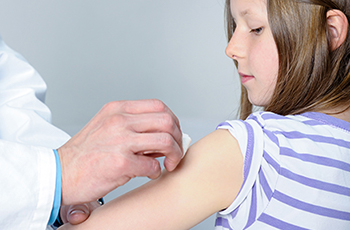
Back to school not only means gathering school supplies, packing lunches and enduring the groans of homework—it also means making sure your child’s vaccinations are up to date.
When it comes to immunization, there really is no question. Without proper immunization, many vaccine-preventable diseases can have dangerous consequences, from seizures and brain damage to blindness and even death—for your child, yourself and others around you both. Before you consider forgoing vaccinations, talk with your child’s health care provider.
To give you added peace of mind, Peter Christensen, DO, with Holland Hospital Family Medicine – South Washington, answers some common questions about vaccination safety:
Are vaccines tested and monitored for safety?
Before vaccines are licensed, the Food and Drug Administration (FDA) requires extensive testing. Once the vaccine is in use, the Centers for Disease Control and Prevention (CDC) and FDA monitor any adverse effects through a reporting system called the Vaccine Adverse Event Reporting System (VAERS).
But are vaccines really necessary today?
Diseases like polio and diphtheria may sound like worries of the past, but the truth is, while vaccines have reduced the occurrence of illnesses like these, the viruses and bacteria that cause them are still around. When vaccination rates fall, diseases once believed to be eradicated can return. The recent rise of measles cases is just one example.
Who shouldn’t be vaccinated?
Some people shouldn’t receive certain vaccines or wait to get them. For example, children with compromised immune systems (e.g. cancer patients) may need to wait. If a person has already had a severe allergic reaction to a vaccine (rare), a follow-up dose isn’t recommended.
What should you do if your child has a reaction to a vaccine?
- Call your doctor. If the reaction is severe, see your doctor immediately.
- Tell your provider what happened, when it happened and when the vaccine was given.
- Fill out a VAERS form.
Are there any side effects?
Vaccines usually have no side effects, or only cause mild reactions like fever or soreness at the injection site. Be sure to tell your provider if your child has any health problems, or known allergies to medications or food.
What about a link with autism?
Misinformation about vaccine safety continues to confuse parents who are trying to make the best decisions about their children’s health. While there’s still much to learn about autism, research does not support the claim that vaccines play a role in causing it. In fact, the American Academy of Pediatrics (AAP), American Medical Association, CDC and Institute of Medicine agree that science does not support a link between thimerosal in vaccines and autism.
Which vaccines does my child need?
Protecting your children is your top priority, no matter their age. Whether they’ve just been born or are headed off to college, you can help shield kids from many serious diseases by ensuring they’re vaccinated. You can learn more about recommended immunization schedules by age from the CDC or AAP.